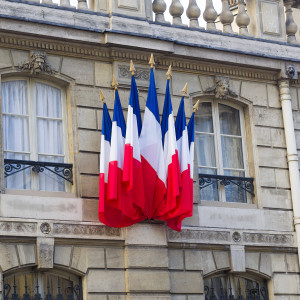In the Dec. 6 French elections to regional and local parliaments the National Front got more than 28 percent of the votes nationwide. The aggressively nationalist party edged out former president Nicolas Sarkozy’s moderately conservative Republican party (27 percent) and clearly beat current President Francois Hollande’s Socialists (23).
This election has repercussions far beyond French borders. The National Front is continuing to gain momentum. After winning the French part of the 2014 European Parliament elections, the party is going to use its most recent electoral gains as a launch pad for victory in the 2017 presidential and national parliamentary elections.
What makes National Front so influential and, frankly, dangerous is its position as the most established of Europe’s nationalist parties. Its brand of nationalism may not be the most aggressive out there — for example, the party has no official relations with Golden Dawn, Greece’s openly Nazi party. However, its nationalism is unapologetic and could easily tip over the line in the direction of Golden Dawn.
From an American viewpoint it is crucial not to confuse National Front’s nationalism with American patriotism. Nationalism has deep roots in European politics, culture and history. The nation is elevated above the individual, and everything that is associated with the nation as an entity — language, religion, culture, heritage, history, destiny — is bundled into a collective “cause.”
The individual, who is the building block of the American constitutional republic, is reduced to an instrument for the furtherance of the nationalist cause.
The Greek version of nationalism also incorporates demography as part of what defines the nation — hence it is correctly branded as Nazism. Under Marine Le Pen’s leadership National Front has striven to distance itself from demographic nationalism, but that is more than likely going to change in the wake of rising hostility toward Islam.
It is not very difficult to see how the Islamist terror attacks in France this year serve as a catapult for National Front to yet more political gains. President Hollande and his socialist government have launched a campaign against radical Islamist preachings. This is not something socialists do frivolously — it is instead an attempt by Hollande to remove some of the reasons people vote for National Front.
As the December 6 elections show, his strategy failed. Instead it is more probable than ever that Marine Le Pen will be the next French president.
Those who expect her to take a more statesmanlike attitude to political power once she occupies the Élysée Palace are going to be very disappointed. She consistently uses sharp nationalist rhetoric; lawsuits based on that rhetoric have not slowed her political momentum. Quite the contrary.
In addition to bringing aggressive nationalism to the European political forefront, with all its repercussions for Muslims and non-European immigrants, Le Pen is also likely to be the catalyst for the implosion of the entire European integration project. If elected president, one of her first orders of business will be to reintroduce the franc and to begin a French exit from the European Union.
Theoretically, the EU could survive that challenge. In practice, though, Le Pen as French president will inspire nationalist movements in Belgium, Denmark, Sweden, Finland, Poland and Austria.
Together with Hungarian nationalist president Viktor Orban, the nationalist movements would be a formidable threat to the future of both the euro and the EU itself.
At the same time, rising nationalism does not come without challenges. The radical left is also on the march in Europe. It has capitalized all across Europe on the past eight years of deep economic recession. Viewing themselves as one another’s logical adversaries, nationalists and socialists are pulling the electorate away from the moderate, pro-EU center of the political stage.
As the EU withers, a new, fragmented political landscape will emerge. In addition to an elevated risk for destructive conflicts, this new landscape could also Balkanize Europe’s foreign policy. Some, like Le Pen, are strong proponents of closer ties with Russia; others will want to maintain first-rate relations with the United States.
Either way, Europe’s nationalist turn is bad news. The next president of the United States needs to be prepared to dive right into the challenges, foreign policy as well as military, that arise in Europe. As we know her, the Old World will probably not survive the next few years.

